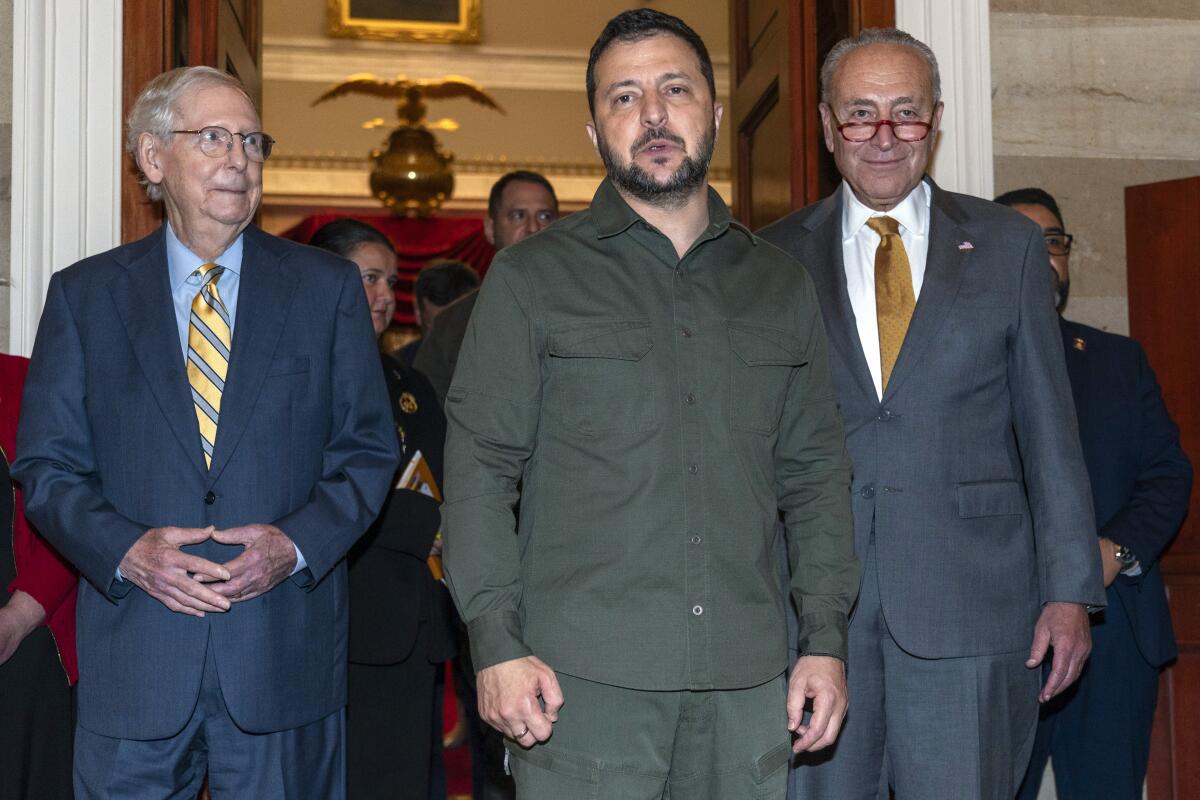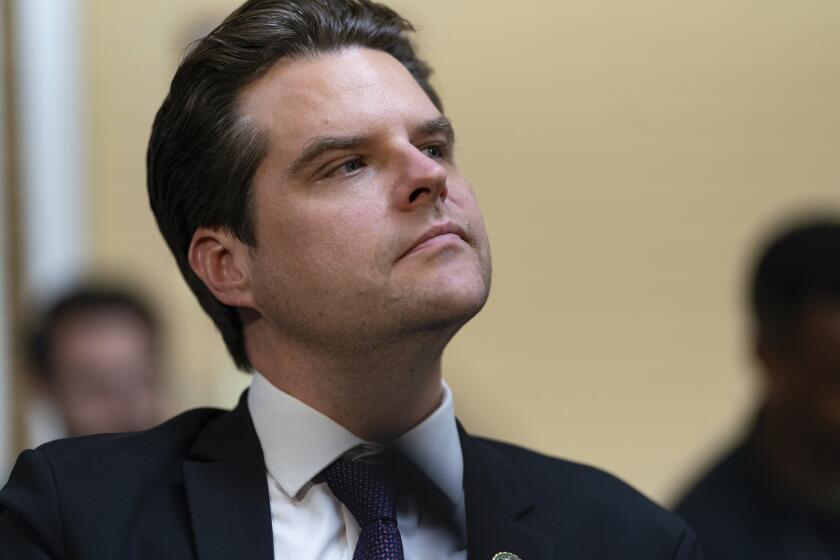Biden says there’s ‘not much time’ to keep aid flowing to Ukraine and Congress must ‘stop the games’

- Share via
WASHINGTON — President Biden said Sunday that American aid to Ukraine will keep flowing for now as he sought to reassure allies of continued U.S. financial support for the war effort. But time is running out, the president said in a warning to Congress.
“We cannot under any circumstances allow American support for Ukraine to be interrupted,” Biden said in remarks from the Roosevelt Room after Congress voted late Saturday to avert a government shutdown by passing a short-term funding package that dropped assistance for Ukraine in the fight against Russia.
“We have time, not much time and there’s an overwhelming sense of urgency,” he said, noting that the funding bill lasts only until mid-November. Biden urged Congress to negotiate an aid package as soon as possible.
“The vast majority of both parties — Democrats and Republicans, Senate and House — support helping Ukraine and the brutal aggression that is being thrust upon them by Russia,” Biden said. “Stop playing games, get this done.’’
But many lawmakers acknowledge that winning approval for Ukraine assistance in Congress is growing more difficult as the war grinds on.
Republican resistance to the aid has been gaining momentum in the halls of Congress.
Voting in the House this past week pointed to the potential trouble ahead. Nearly half of House Republicans voted to strip $300 million from a defense spending bill to train Ukrainian soldiers and purchase weapons. The money later was approved separately, but opponents of Ukraine support celebrated their growing numbers.
Then on Saturday, House Speaker Kevin McCarthy (R-Bakersfield) omitted additional Ukraine aid from a measure to keep the government running until Nov. 17. In doing so, he closed the door on a Senate package that would have funneled $6 billion to Ukraine, roughly a third of what has been requested by the White House. Both the House and Senate overwhelmingly approved the stopgap measure, with members of both parties abandoning the increased aid for Ukraine in favor of avoiding a costly government shutdown.
Rep. Matt Gaetz says he’ll try to remove House Speaker Kevin McCarthy, a fellow Republican, from his leadership position this week.
Biden said that deal was made to keep the government running, and he worked to reassure U.S. allies additional funding would be there.
“Look at me,” he said turning his face to the cameras at the White House. “We’re going to get it done. I can’t believe those who voted for supporting Ukraine — overwhelming majority in the House and Senate, Democrat and Republican — will for pure political reasons let more people die needlessly in Ukraine.”
Foreign allies were surprised and concerned. European Union foreign policy chief Josep Borrell said Sunday from Kyiv that he believed it wouldn’t be the last word on funding from the U.S., but he noted the EU’s continued substantial financial support for Ukraine and a new proposal on the table for additional funding .
“I have a hope that this will not be a definitive decision and Ukraine will continue having the support of the U.S.,” he said.
The latest actions in Congress signal a gradual shift in the unwavering support that the United States has so far pledged Ukraine in its fight against Russia, and it is one of the clearest examples yet of the Republican Party’s movement toward a more isolationist stance. The exclusion of Ukraine funding came little more than a week after lawmakers met in the Capitol with Ukrainian President Volodymyr Zelensky who sought to assure lawmakers that his military was winning the war, but stressed that additional aid would be crucial for continuing the fight.
After that visit, Senate Majority Leader Charles E. Schumer (D-N.Y.) said that one sentence summed up Zelensky’s message in his meeting with the Senate: “ ‘If we don’t get the aid, we will lose the war,’ ” Schumer said.
Yet, McCarthy, pressured by his right flank, has gone from saying “no blank checks” for Ukraine, with the focus being on accountability, to describing the Senate’s approach as putting “Ukraine in front of America.” He declined to say after the vote on government funding whether he would bring aid for Ukraine up for a House vote in the coming weeks.
“If there is a moment in time we need to have a discussion about that, we will have a discussion completely about that, but I think the administration has to make the case for what is victory,” McCarthy said.
Biden said in a statement after Congress averted a shutdown that “we cannot under any circumstances allow American support for Ukraine to be interrupted.” He called on McCarthy to “keep his commitment to the people of Ukraine” and push through “the support needed to help Ukraine at this critical moment.”
In the Senate, Schumer and Senate Republican leader Mitch McConnell of Kentucky pledged to move quickly to try to pass the full White House request. But it was clear that goal will be increasingly difficult as more rank-and-file GOP senators have questioned the aid or demanded that it be attached to immigration policy that would help secure the southern border — echoing similar demands in the House.
Florida Sen. Rick Scott, a Republican who voted for the spending bill after the Ukraine aid was stripped out, said that Congress needs to have “a conversation with the American public.” He said he was optimistic after seeing the money taken out of the bill.
“In my state, people want to be helpful to Ukraine, but they also want to be helpful to Americans,” Scott said. “And so they want to really understand how this money has been spent.”
Democrats said they were disappointed by the lack of Ukraine funding, but expressed determination that they would get the aid to the war-torn country.
“We will not stop fighting for more economic and security assistance for Ukraine,” Schumer said after the bill passed. “Majorities in both parties support Ukraine aid, and doing more is vital for America’s security and for democracy around the world.”
Leading up to Saturday’s vote, Pentagon officials expressed alarm at the prospect of no extra funding for Ukraine. In a letter to congressional leaders dated Friday, Michael McCord, undersecretary of Defense, wrote that the department has exhausted nearly all the available security assistance.
“Without additional funding now, we would have to delay or curtail assistance to meet Ukraine’s urgent requirements, including for air defense and ammunition that are critical and urgent now as Russia prepares to conduct a winter offensive and continues its bombardment of Ukrainian cities,” McCord said.
Defense Secretary Lloyd J. Austin III said after the vote that U.S. assistance was vital as Ukrainians “fight to defend their own country against the forces of tyranny. America must live up to its word.”
Rep. Mike Rogers, the Republican chairman of the House Armed Services Committee, said he would like to send a clear message to the world about U.S. support for Ukraine by passing legislation, but believes the Pentagon has “enough draw-down money” to last through December. He said he believes McCarthy still supports funding for Ukraine.
“I think the speaker has always had a good position on Ukraine. I think he’s dealing with a caucus that’s got fractures that he has to deal with and none of them can be ignored when you’ve got a four-seat majority and 15 nuts in the conference,” Rogers said, referring to far-right lawmakers who have staunchly opposed funding for Ukraine.
Rep. Gregory Meeks (D-N.Y.), the top Democrat on the House Foreign Affairs Committee, said he heard McCarthy tell Zelenskyduring his visit that “we will give them what they need.”
“Unfortunately, the message that speaker and the former president is sending is that they can’t be relied upon,” Meeks said, adding a reference to former President Trump, who has called on Congress to withhold additional Ukraine funding until the FBI, IRS and Justice Department “hand over every scrap of evidence” on the Biden family’s business dealings.
The U.S. has approved four rounds of aid to Ukraine in response to Russia’s invasion, totaling about $113 billion, with some of that money going toward replenishment of U.S. military equipment that was sent to the front lines. In August, Biden called on Congress to provide for an additional $24 billion.
Saturday’s move by the House to act first on government funding left the Senate with a stark choice: either go along with a bill that fails to help Ukraine, or allow what could have been an extended government shutdown to occur.
Sen. Christopher S. Murphy (D-Conn.) expressed frustration at the outcome.
“Every day that goes by that we don’t get the additional money is a day Russia gets closer to being capable of winning this war,” Murphy said.
Sen. Jim Risch of Idaho, the top Republican on the Senate Foreign Relations Committee, said Ukraine should not be deterred, and that aid can be approved by other means.
“Neither our friends nor our enemies should look at this as being some change in the United States’ commitment to Ukraine,” Risch said.
More to Read
Sign up for Essential California
The most important California stories and recommendations in your inbox every morning.
You may occasionally receive promotional content from the Los Angeles Times.











